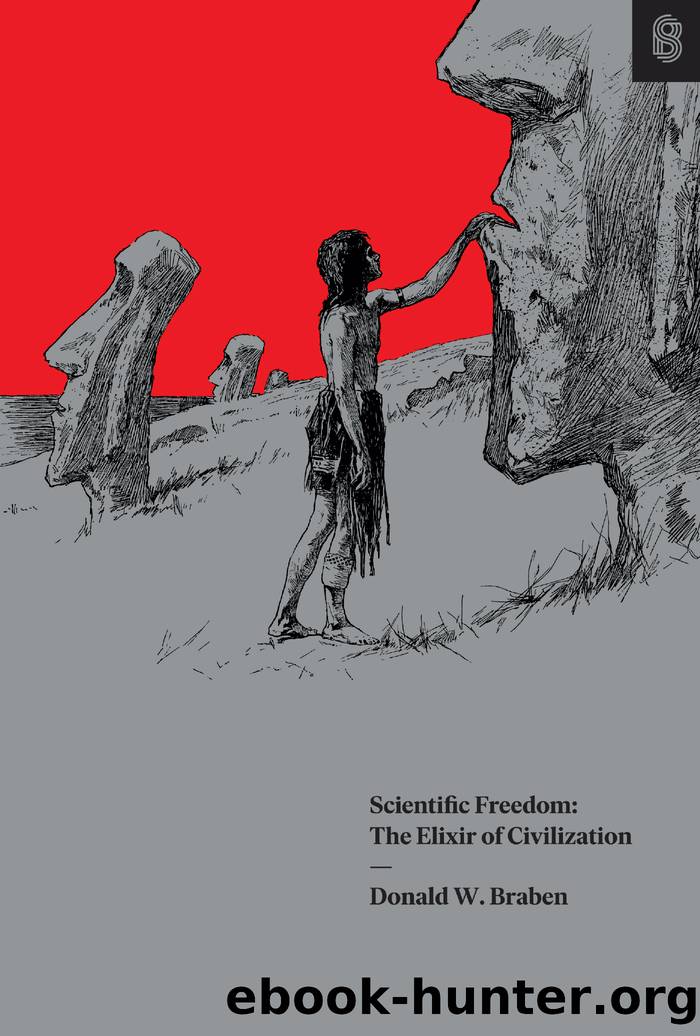Scientific Freedom by Donald W. Braben

Author:Donald W. Braben [Braben, Donald]
Language: eng
Format: epub
ISBN: 9780578675916
Publisher: Stripe Press
Published: 2020-10-10T00:00:00+00:00
Technology is derived from major scientific discoveries made decades ago.
Managed creativity can at best produce only what its managers specify.
Efficiency and accountability can sometimes be the worst possible policies.
We must begin to create a twenty-first-century Planck Club.
Managed creativity (by which I mean creativity directed toward a specific objective or confined in any way) may sound like a good idea, but as my wizard tried to warn us (see Poster 3), we do not understand creativity. In these circumstances, the best we can do is to give those rare individuals who seem capable of transformative thinking the freedom to bring their ideas to fruition. Efficiency and accountability have their places; there is little harm in insisting that researchers who know where they are going and when they expect to get there should justify details of their trips. But putative members of the Planck Club should hold themselves accountable only to Nature herself. It took 20 years for Planck to reach his goal, but he had no idea how long it would actually take nor could he have precisely specified it when he set out. What was his efficiency? The question is irrelevant, of course.
The first stirrings of a Fifth Revolution might be heralded by a serious attempt to set up a transformative research initiative.8 However, it may not be possible to bring about such a momentous event in one throw. It may need several iterations before a full-fledged TR initiative appears in all its glory because some of the bad habits developed since 1970 or so have become deeply engrained. That most pernicious instrument of consensus, peer review of proposals, will probably be the most obdurate because it has acquired the status of the gold standard of research quality even though it fails the Planck test. Unfortunately, the gold is the foolâs variety, and a TR initiative based on this flawed standard will also fail. We may need patience, therefore. Although the mandatory use of peer preview has been in force for only a few decades, it seems to have infected the very soul of research enterprise. It may need a few rounds of pseudo-TR initiatives before the funding agencies finally bite this bullet. Let us hope that meanwhile some of us have not slid into the Damocles Zone and possible collapse.
Another clear sign would be a proliferation of attempts to protect the university and its most valuable traditions. Before 1970 or so, its elite status was universally acknowledged. However, more recent policies adopted by many advanced nations, such as the OECD member states, would extend the privileges of a university education to some 40% or 50% of the student cohort.9 Figure 12 gives the total student enrollment in the United States since 1967.
Download
This site does not store any files on its server. We only index and link to content provided by other sites. Please contact the content providers to delete copyright contents if any and email us, we'll remove relevant links or contents immediately.
| Automotive | Engineering |
| Transportation |
Whiskies Galore by Ian Buxton(40298)
Introduction to Aircraft Design (Cambridge Aerospace Series) by John P. Fielding(32331)
Small Unmanned Fixed-wing Aircraft Design by Andrew J. Keane Andras Sobester James P. Scanlan & András Sóbester & James P. Scanlan(32135)
Craft Beer for the Homebrewer by Michael Agnew(17439)
Turbulence by E. J. Noyes(7032)
The Complete Stick Figure Physics Tutorials by Allen Sarah(6631)
Kaplan MCAT General Chemistry Review by Kaplan(6044)
The Thirst by Nesbo Jo(5778)
Bad Blood by John Carreyrou(5761)
Learning SQL by Alan Beaulieu(5399)
Weapons of Math Destruction by Cathy O'Neil(5029)
Man-made Catastrophes and Risk Information Concealment by Dmitry Chernov & Didier Sornette(4728)
iGen by Jean M. Twenge(4693)
Digital Minimalism by Cal Newport;(4511)
Life 3.0: Being Human in the Age of Artificial Intelligence by Tegmark Max(4492)
Audition by Ryu Murakami(4091)
1,001 ASVAB Practice Questions For Dummies by Powers Rod(4034)
Electronic Devices & Circuits by Jacob Millman & Christos C. Halkias(4021)
Pale Blue Dot by Carl Sagan(3996)
